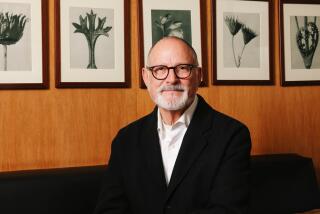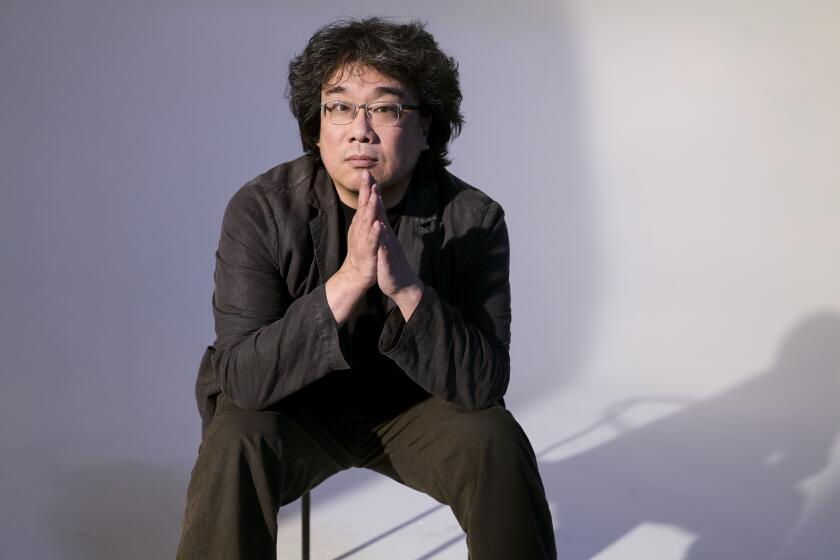Picking up a son’s painful journey in ‘My Architect’
- Share via
Facing a student questioner at New York’s Fashion Institute of Technology shortly before his death in 1974, the great architect Louis I. Kahn belittled his own achievement. Noting that he began his artistic career at age 3, he added: “And I can definitely say I think I’ve accomplished nothing.” This self-disparagement was no mere affectation. Steven Korman, a client, recalls holding Kahn as he sobbed that his own father had never respected him. “Your dad was hurting a lot,” Korman tells Nathaniel Kahn, the architect’s only son and the director of “My Architect: A Son’s Journey.”
These are two of the most surprising additional scenes in the DVD version of “My Architect,” being released today by New Yorker Video. The DVD, which also features an intimate Q&A; with the director, more views of Kahn’s buildings and a booklet with a timeline of his life, sheds new light on the biographical mysteries probed in the award-winning documentary.
Collectively, the new material suggests that, as much as his son Nathaniel, Louis Kahn may have been a man in search of a father.
“That seemed like a real revelation,” Nathaniel Kahn said in a recent telephone interview. “To think that a guy at the height of his career was still thinking of his own father -- that leaves you with a funny feeling.” The 41-year-old Manhattan-based filmmaker said he had hoped to find a way to include the Korman conversation, which dates from his first day of shooting, in the finished documentary. “I didn’t know how to follow up properly,” he said. “I should have pushed more and found out more.”
In the Q&A;, conducted at Images Cinema in Williamstown, Mass., last October, Nathaniel says he had to weed through more than 200 hours of film to create “My Architect,” which last year earned an Academy Award nomination and a prize from the Directors Guild of America. He plans to deposit the footage in the film archives at the University of Pennsylvania, where it will be accessible to scholars.
In making the DVD, Kahn “tried to address a lot of the questions people tend to ask,” including the increasing popularity of documentaries and the reaction of his mother, the landscape architect Harriet Pattison. (The elder Kahn remained married to Esther Israeli, with whom he had a daughter, and he also had a daughter with his longtime collaborator, the Philadelphia architect Anne Tyng.) Nathaniel Kahn says on the DVD that the film’s New York opening night audience applauded his mother, who braved social disapproval to raise Nathaniel. “So at that moment,” he says, “I know she liked the film very much.” At one point, the director describes his quest for rare archival footage that would show his father as a man rather than an architect. “Finding those things was like Christmas morning,” he says, a quote that resonates with the film’s revelation that Kahn never spent a Christmas with Nathaniel and his mother.
The Fashion Institute scene, Nathaniel said, was filmed shortly before his father died, and in it “he seems to be reflecting on the artistic life.” The architect turns aside a student’s comment about how long artistic success can take by saying, “Why not? Do you want to die younger?” Said Nathaniel, “For our era, that was such a thoughtful thing to say.... He always felt like really he was just starting, and his best work was yet to come.” The clip ends, ironically, with a teacher telling the class, “Mr. Kahn has to catch a train back to Philadelphia,” evoking both his peripatetic life and his eventual death of a heart attack in New York’s Pennsylvania Station.
Also on the DVD are scenes of the construction of the Salk Institute for Biological Studies in La Jolla, one of Kahn’s masterpieces, and additional glimpses of his final achievement, the monumental capital complex in Dhaka, Bangladesh. In a voice-over, Nathaniel Kahn underlines Dhaka’s contemporary significance as “a building built by a Jewish architect in a Muslim country.”
The documentary makes clear Louis Kahn’s influence on colleagues and strangers, as well as his tendency to neglect his three families. “I know I should feel anger at my father for certain things,” Nathaniel Kahn said. “But since he died when I was 11, I never got to that point. It’s hard to get there now.” During the film, “your feelings about him are constantly changing ... as my feelings about him are constantly changing. What really astonishes me is, even though this person’s been dead for 30 years, if you go on that journey, you will have a dynamic relationship with them -- and it’s not too late because they’re dead.” For aficionados of the film, the DVD continues that journey.
“I hope that I can keep going in the same spirit,” added Nathaniel Kahn, who is at work on another documentary and a feature film. “That’s my plan. One of the most gratifying things for me was to be able to tell a story that seemed to resonate with peoples’ lives.”
More to Read
Only good movies
Get the Indie Focus newsletter, Mark Olsen's weekly guide to the world of cinema.
You may occasionally receive promotional content from the Los Angeles Times.










